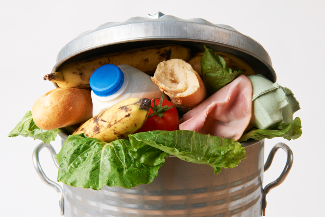Member State Page : Italy
Last updated on the 29/09/2023

In total: 8 650 456 tonnes in 2020
In total: 8 291 265 tonnes in 2021

Retail and other distribution of food: 343 535 tonnes in 2020
Restaurants and food services: 193 915 tonnes in 2020
Households: 6.3 million tonnes in 2020

Target
Currently not set.
Measure
Data on municipal waste is collected through questionnaires sent to public and private entities involved in the collection of information on waste management (regional and provincial agencies for environmental protection; regional, provincial and municipal authorities; provincial waste observatories; and municipally owned or private agencies responsible for managing municipal hygiene services). Moreover, in line with the Legislative decree No 152 of 3 April 2006 (Article 189), companies are obliged to fill out declarations on all types of waste (municipal waste and waste from economic activities). The percentage of kitchen and canteen food waste contained in mixed municipal waste can be estimated by using waste composition analysis.
The baseline for food waste levels is obtained from specific studies (e.g. on the definition of production factors to estimate losses in the food supply chain) and data obtained from the mandatory declarations.
For 2018, the average percentage of food waste calculated at national level is approximately 28.9% of the total mixed municipal waste, which amounts to 12,305 million tonnes. Consequently, the amount of kitchen and canteen waste in mixed municipal waste can be estimated at 3.56 million tonnes.
In the context of the REDUCE project, household food waste was analysed through food diaries and questionnaires, while considering determinants of consumers behaviour and how this might impact the reporting and results achieved. The project also aimed to analyse and quantify food waste in school canteens, measuring food waste through waste weighing and compositional analysis in 78 primary schools across Italy.
The National Observatory on food surplus, recovery and waste, coordinated by the Ministry of Agricultural, Food and Forestry Policies and managed by the Council for Agricultural Research and Economics (CREA), studied the management of surpluses and waste in the fruit and vegetable sector, focussing on the activities of producers’ organisations. The study revealed that less than one third of these food surpluses becomes waste and that the causes of food surpluses are usually due to market distortions, plant diseases or climate conditions. The study also indicated that the Common Market Organisation Regulation is an efficient mechanism to save products that cannot be sold on the market from becoming waste.
Act
The Ministry for Environment, Land and Sea Protection (MELS) adopted the national waste prevention programme through the Directorial decree of 7 October 2013, which identifies bio-waste (especially the food waste fraction) as one of the key targeted waste streams. Italian regions have been called to integrate these provisions within their regional waste management programmes within a year of the adoption of the national programme.
For recovery activities, the Good Samaritan Law (Law 155/2003) is fundamental, as it defines the primary responsibility for donated food. According to this law, non-profit organisations of social utility are considered as final consumers in terms of liability arising from food safety rules.
In 2014, the MELS in collaboration with the Department of Agricultural and Food Sciences of the University of Bologna and the Last Minute Market initiative, defined a national food waste prevention plan known as PINPAS. The plan aimed to engage the main national food supply chain stakeholders in order to identify policy measures to reduce food waste. Although no formal legislative act has been adopted to support the implementation of the plan, the activities carried out under PINPAS and their related findings and recommendations have inspired a number of bills on food waste prevention that led to the approval of Law 166/2016 on food waste. Following the adoption of the law, numerous associations, charities and research centres have been inspired to act, carrying out various actions such as redistributing surplus food to vulnerable people; raising awareness about the importance of conscious consumption and the impacts of food waste; developing technical solutions to prevent food waste etc.
Law No 166/2016, also called the Gadda Law, includes provisions on the donation and redistribution of food and pharmaceutical products for social purpose and to limit waste. The Gadda Law:
- established a National Advisory Round Table (Table for the fight against food waste and for food aid), coordinated by the Ministry of Agriculture and gathering all the actors of the food supply chain (from agriculture to food service sector), charitable organisations and competent authorities (e.g. Ministry of Health, MELS) to study themes related to food redistribution, among other topics;
- provides the establishment of a National Observatory as part of the National Advisory Round Table for collection and harmonising data on surplus food, food redistribution and food waste;
- establishes the hierarchy for the use of surplus food, which prioritises the prevention of surplus food, before its redistribution for human consumption;
- provides for various information and communication actions to the consumer (national communication campaigns; radio and television broadcasts aimed at promoting behaviours and measures to reduce food waste; information and awareness-raising initiatives on the donation and the recovery of food surpluses).
Under the provisions of the Gadda Law, city municipalities may implement tax deductions on food donations made towards charities. Food businesses wishing to benefit from the tax deduction must report their amounts of donated food to the municipality.
Following the Gadda Law, the Ministry of Agriculture has been funding innovative projects to fight against food waste, including new materials for storage and packaging, projects for food recovery and the reuse of surpluses for other purposes (not just food), as well as national civil service projects which ensure practical applications of the results achieved. The MELS also funds actions to reduce food waste, having launched a call for co-funding integrated projects for the management (procurement, transport, storage, conservation, preparation and distribution) of food surpluses that require the purchase of specific operational equipment.
An agreement between the MELS and the National Association of Italian Municipalities (ANCI) was signed for further promoting food waste reduction actions in school food services (through formation/education of teachers, municipal officials and school catering service contracting companies) and in commercial catering (by promoting the take-away of uneaten food; testing the doggy-bag / family-bag in commercial catering and monitoring the avoided waste). Relevant materials can be found on the repository web-site promoted by ANCI.
The MELS finances the project ‘Food waste in Italy: international policies and measurements’. The project aims to increase knowledge on food waste (from definitions to data, methods, intervention tools, including success stories and case studies); to define national priorities and objectives for surpluses and waste prevention and reduction, identifying appropriate areas of intervention and implementation tools (policies, measures, activities, etc.); to measure progress with respect to the targets defined at national and international level (development of response indicators) and to streamline Italy’s involvement in related international work.
Each year, the Ministry of Agriculture proposes communication days or initiatives with schools through CREA, a research body of the Ministry with expertise in food and nutrition, as well as food education campaigns. The national awareness campaign Spreco Zero (Zero Waste) was first implemented as part of the REDUCE project, in order to inform consumers about the issue of food waste and to promote sustainable behaviours. Under the campaign, a national contest called Premio vivere a spreco zero (Living with Zero Waste award) rewards the best initiatives against food waste in several categories, based on their results and transferability.
As part of the national REDUCE project, a kit for education in primary schools was designed and donated to schools, with the aim to promote a deep cultural change among final consumers and raise awareness about the issue of food waste and the need to prevent and reduce it. The kit can be easily integrated with the contents of existing school modules and it can be adapted to specific needs of the class. Different actors, at a decentralized level (municipalities, associations), built their own school kits against food waste.
Law No 92 of 20 August 2019 foresees the introduction of a new model of civic education as a mandatory module in the Italian school system, addressing various topics among which the 2030 Agenda for Sustainable Development of the United Nations. Teachers can choose to address the topic of food loss and waste within this module.
